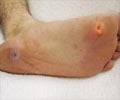Increasing the amount of money spent on preventive care would bring positive results and advantages for the economy, say Australian Doctors.

Professor Stephen Robson, President, Australian Medical Association.
Go to source).
‘Keeping people healthy not only reduces the strain on our healthcare system by preventing illnesses but also drives economic growth and productivity by minimizing healthcare costs. #Prevention #Treatment #Australia
’





He described the current system as one of "sick care" rather than one focused on keeping Australians well, increasing pressure on hospitals. According to Robson, a significant boost in spending on preventative care would reap in benefits for the economy. The speech coincided with the release of a new AMA report showing that public hospital elective surgery waiting lists cost the Australian economy A$4.6 billion ($3.1 billion) annually.
Sugary Drink Tax Can Lead to 16,000 Fewer Diabetes Cases
The report highlights the growing rate of chronic disease, with almost half the population in the country having one or more chronic diseases and an aging population that is putting the healthcare system under increasing pressure."As the AMA analysis uncovered, we currently have hundreds of thousands of people waiting too long for elective surgery, people waiting too long in emergency departments and general practices struggling to survive," Robson said in a statement.
"While it's true that investment is needed to tackle these issues, we can also improve efficiency, improve access to care and the quality of care."
The AMA report said that addressing hospital exit block could save A$2 billion per year, and modelling estimated that a tax on sugary drinks, which it has long campaigned for, would result in 16,000 fewer cases of type 2 diabetes, 4,400 fewer cases of heart disease, and 1,100 fewer cases of stroke.
Advertisement
Reference:
- Professor Stephen Robson, President, Australian Medical Association - (https://www.npc.org.au/speaker/2023/1188-professor-stephen-robson)
Source-IANS










